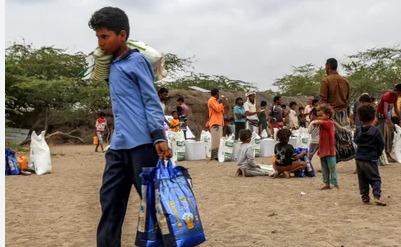How US Foreign Aid Policy Is Driving Yemen’s Children to Beg

The United States' sudden suspension of aid to Yemen is driving one of the world’s most vulnerable populations, its children, into the streets. Amid collapsing support systems and dwindling humanitarian relief, many Yemeni children are now forced to beg or work simply to feed their families.
 In January 2025, the Trump administration announced a 90-day pause on all foreign assistance. Six weeks later, Secretary of State Marco Rubio confirmed that 83% of USAID programmes had been cancelled. This included nearly all US-funded humanitarian operations in Yemen, despite it being the country’s single largest aid contributor.
In January 2025, the Trump administration announced a 90-day pause on all foreign assistance. Six weeks later, Secretary of State Marco Rubio confirmed that 83% of USAID programmes had been cancelled. This included nearly all US-funded humanitarian operations in Yemen, despite it being the country’s single largest aid contributor.
“Unless the US immediately reinstates sufficient funding for lifesaving aid to Yemen...millions of people in Yemen are going to be left without desperately needed support,” warned Diala Haidar, Amnesty International’s Yemen researcher.
The consequences have been catastrophic. Cash assistance, food baskets, and water tanks that previously sustained displaced families have been withdrawn. Parents now see no option but to send their children to beg or take up manual labour.
“We had no solution but to send our children to beg in markets, and those who could work did,” said Ahmed Ghalib, a father of four living in a displacement camp in Taiz. “Sometimes, when what the children earned wasn't enough, I would go myself to beg for leftovers from restaurants.”

Ten-year-old Mohammed Abdullah, who had just begun school, now works on qat farms and collects plastic bags to feed his family of seven. “I prefer to work rather than beg, but if there is no work and no food at home, I'm forced to beg,” he said.
Aid groups have had to make impossible choices about which services to maintain. “Many families have been forced to take desperate measures,” said a humanitarian worker who asked to remain anonymous. “I know some who send their children to beg, and many who survive on just one meal a day.”
The US freeze pulled $107 million from food aid alone, which the UN World Food Programme said could amount to a “death sentence” for millions.
The cuts are impacting an estimated 2.4 million people reliant on food assistance and more than 100,000 children receiving nutritional support. Almost half of Yemen’s population is food insecure, and one in two children under five is acutely malnourished, according to UN agencies.
But it’s not just the food. The loss of US funding has shut down shelters, ended cash support, and suspended healthcare for children and pregnant mothers.
“Hundreds of women will be impacted… We are no longer providing psychological support,” said a local women’s organisation representative. “Legal aid counselling will also stop.”
The cuts came alongside Washington’s re-designation of the Houthis as a foreign terrorist organisation, without creating exemptions for humanitarian aid. As a result, most relief operations in Houthi-controlled areas, where the majority of people in need live, were frozen.
“It’s a blind tool,” said Yemen analyst Ahmed Nagi. “The defunding doesn’t just affect the areas held by the Houthis but all the country.”

The effects have also silenced the very groups working to defend human rights.
“Funding cuts do not just end projects,” a Yemeni human rights defender told Amnesty. “Funding cuts silence victims’ voices and weaken justice in Yemen.”
Children are now learning how to survive, not how to live. “We’re watching a generation grow up learning the skills of begging and hard labour, instead of receiving a proper education,” Ghalib said.




